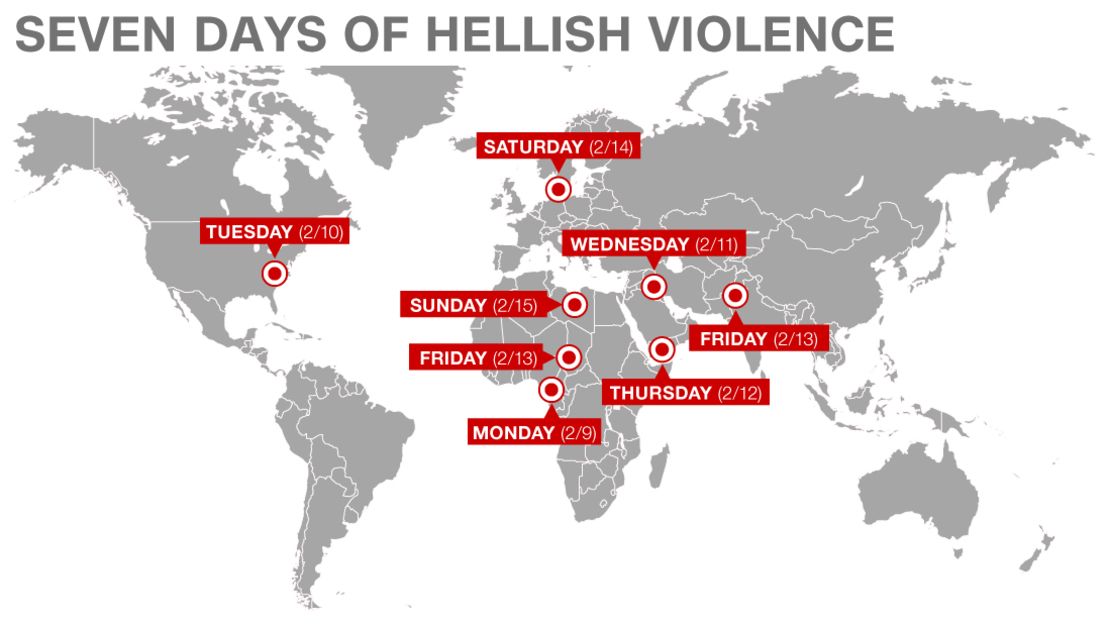Story highlights
Every day last week witnessed a violent attack on people of faith
Experts on religious violence, though, say it's too soon to predict a trend
Whether you believe that religious violence is fueled by faith or is a symptom of larger factors – political instability, poverty, cultural chaos – one thing seems clear: Last week was hellish for religion.
Across several continents, including North America, Europe, Asia and Africa, scores of religious believers suffered and died in brutal attacks over the past seven days. Christians, Muslims and Jews alike all fell prey to assaults.
The causes of violence are complex, and reducing them to talking points only adds to the problem, scholars say. But if you want to rally troops to your side, few tools are more powerful than religion, said Michael Jerryson, co-editor of “The Oxford Handbook of Religion and Violence.”
“If you can turn a battle into good versus evil, or doing God’s will, you will get so much more devotion,” he told CNN. “It’s a calling that invokes more than the mundane; it raises the stakes.”

Experts in religious violence say it’s too soon to tell whether last week witnessed more terrorist attacks than usual. It often takes several months, if not longer, to tally all of the assaults in a given period of time.
Even so, the brazenness of the attacks – a gunman shooting up a cafe and a synagogue in a European capital, ISIS decapitating 21 Christians – makes the past seven days stand out as particularly brutal.
Here are just some of the assaults carried out since last Monday.
Monday
Boko Haram, the Muslim militant group based in Nigeria, attacked several towns in neighboring Cameroon, kidnapping 20 people. The Islamic extremists also detonated a car bomb in Niger, according to The Associated Press. The death toll is still unclear.
One of the world’s most deadly terrorist groups, Boko Haram threatened to continue its assaults, even as several African nations amassed armies to confront it.
“Your soldiers are infidels, and God’s soldiers are victorious,” Abubakar Shekau, Boko Haram’s leader, said in a video recently posted to YouTube.
Tuesday
Craig Stephen Hicks, an ardent atheist who railed online against religion, was accused of killing three young Muslims in Chapel Hill, North Carolina.
Police said the shootings likely resulted from a long-running dispute between Hicks and his neighbors over parking spaces.
But Muslims immediately urged the Obama administration to investigate the murders as a hate crime, and the hashtag #MuslimLivesMatter trended on Twitter.
Suzanne Barakat, the sister of one of the victims, said her family members were targeted because they were Muslims and that the slayings should be considered an act of terrorism.
“It’s time people call it what it is,” Barakat said.
Wednesday
ISIS, the Muslim militant group that calls itself the “Islamic State,” launched several attacks across Iraq, striking Kurdish forces in the North and Iraqi civilians in Baghdad.
At least 31 people were killed in Baghdad, including a top Sunni Muslim leader and 10 Shiite Muslims, according to international reports, as ISIS bombs exploded in several neighborhoods.
Thursday
Al Qaeda killed four Yemeni soldiers while seizing a critical military base in the town of Baihan, taking control of its weaponry, according to local security officials.
U.S. officials consider al Qaeda in the Arabian Peninsula, which is based in Yemen, the most dangerous branch of al Qaeda. Its sworn enemies, the Houthis, have taken over the nation’s capital, throwing the country into chaos.
By Friday, Saudi Arabia, Germany and Italy closed their embassies in Yemen, following the United States and other nations.
“Yemen has turned into another failed state in the Middle East,” former Defense Secretary Leon Panetta told CNN, “giving al Qaeda a free hand to do what it wants.”
Friday
Boko Haram continued its cross-border attacks, killing four civilians and a soldier in neighboring Chad.
The deaths came hours after 21 people were killed in two separate attacks on Akida and Mbuta villages near the northeast Nigerian city of Maiduguri, according to residents and a local community leader.
The violence in northeast Nigeria, Boko Haram’s home base, has caused more than 157,000 people to flee into Niger, Cameroon and Chad, according to Adrian Edwards, a spokesman for the U.N. High Commissioner for Refugees.
Also on Friday, an attack on a Shia mosque in Peshawar, Pakistan, killed 19 worshippers and injured dozens of others, the U.N. reported.
The Pakistani Taliban claimed responsibility for the attack, according to Reuters.
Saturday
A gunman opened fire at a free-speech forum in Copenhagen, Denmark, where a Swedish cartoonist who had depicted the Prophet Mohammed was scheduled to speak.
By the end of the melee, the gunman had wounded three officers and killed a 55-year-old man.
Hours after the cafe attack, police said, the gunman made his way to a Copenhagen synagogue and once again opened fire. Two officers were wounded, and a man providing security for a bat mitzvah party behind the synagogue died.
Danish authorities theorize that attacks may have been modeled on the assaults that killed 17 in Paris last month, and Jewish leaders say they are worried about a rising tide of anti-Semitism sweeping across the continent.
Sunday
In a new video released Sunday by ISIS, the militant group claims to have beheaded over a dozen members of Egypt’s Christian minority on a Libyan beach.
The video shows jihadists in black standing behind each of the victims, who are dressed in orange jumpsuits with their hands cuffed behind them.
The five-minute video, released by the terror group’s propaganda wing al-Hayat Media, includes a masked English-speaking jihadi who says, “The sea you have hidden Sheikh Osama bin Laden’s body in, we swear to Allah, we will mix it with your blood.”
All the victims are then shoved to the ground and beheaded.
CNN’s Holly Yan, Susanne Gargiulo. Laura Smith-Spark and Aminu Abubakar contributed to this report.


















